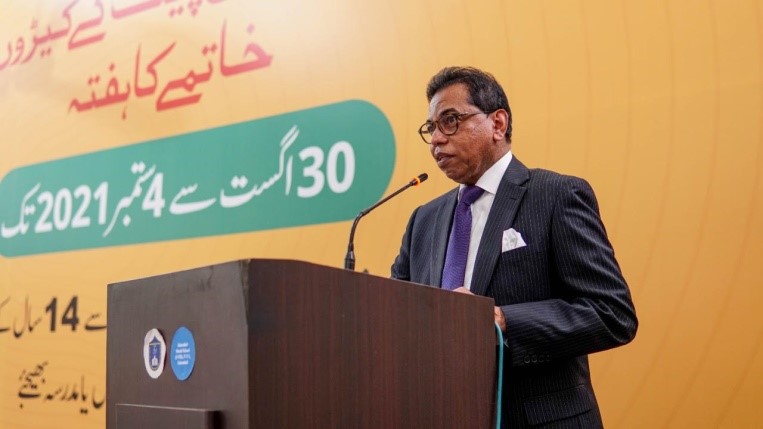Situation reports on the flooding in Pakistan
Cases of malaria, cholera, acute watery diarrhoeal disease and dengue continues to decline in most districts.
Government plans are under way to reconstruct all 7878 health houses for lady health workers. The total cost of the plan is 9.879 billion PKR.
PDMA Sindh distributed tents (> 800 000), plastic tarpaulin (>580 000), mosquito nets (> 3.7 million), ration bags (2.38 million), RO plants (28), jerry cans (> 112 000), folding beds (>8 000), kitchen sets (>57 000) to the flood-affected population.
In November 2022, 70 suspected cases of diphtheria were reported from the flood affected provinces of KP, Sindh and Punjab.
Situation report on the flooding in Pakistan, 2 December 2022
Situation report on the flooding in Pakistan, 25 November 2022
Situation report on the flooding in Pakistan, 3 September 2022
Situation report on the flooding in Pakistan, 30 August 2022
News
Selfless heroes battling health emergencies in flood catastrophe
28 September 2022
Pakistan’s people ravaged by calamitous floods
18 September
Deworming week targets 574 000 schoolchildren
 WHO Representative in Pakistan Dr Palitha Mahipala addresses attendees at the deworming week campaign launch
WHO Representative in Pakistan Dr Palitha Mahipala addresses attendees at the deworming week campaign launch
31 August 2021 – Deworming week from 30 August to 4 September is targeting 574 000 schoolchildren in 2000 government and private schools, as well as Deeni Madaris, in Islamabad. WHO Representative in Pakistan Dr Palitha Mahipala attended the launch ceremony of the school-based deworming programme in Islamabad, supported by WHO and the Institute for Research Development, which was also attended by Special Assistant to the Prime Minister on Capital Development Authority Affairs Mr Ali Nawaz Awan.
“WHO estimates that over 1.5 billion people are globally infected with soil-transmitted helminths, of whom, over 835 million are children who are in need of treatment. Intestinal worms easily transmit in areas with contaminated soil and poor sanitation, disproportionately affecting children and poorer segments of society. Schoolchildren (5–14 years old) are an important high-risk group for soil-transmitted helminths infections and generally suffer the greatest intensity and morbidity. It is gratifying to witness the commitment of the Government of Pakistan and the continued technical support of the Institute for Research Development of Pakistan in combating helminth infections. The deworming campaign falls perfectly in line with the WHO’s mission to improve the health and lives of individuals globally, and WHO has been extending its full support to the campaign and will continue to be so,” remarked Dr Palitha Mahipala.
World Hepatitis Day 2021: Hepatitis can’t wait

Message from Dr Palitha Mahipala, WHO Representative
27 July 2021 – WHO is urging countries to eliminate viral hepatitis as a public health problem by 2030.
This year, we are commemorating World Hepatitis Day amid the ongoing COVID-19 pandemic. World Hepatitis Day represents an occasion to reflect on our commitment towards the continuity of hepatitis services and the elimination targets, called by the Global Health Sector Strategy and embedded in our regional vision “Health for All by All”.
The theme of World Hepatitis Day this year is “Hepatitis can’t wait”, which conveys the urgency of efforts needed to eliminate hepatitis as a public health threat by 2030. With a person dying every 30 seconds from a hepatitis-related illness – even in the current COVID-19 crisis – we can’t wait to act on viral hepatitis.
Pakistan is facing numerous challenges in its hepatitis response. It has the highest prevalence of hepatitis C (5%) globally and the highest number of people suffering from hepatitis C virus after China.
COVID-19 has further challenged the response and the country's essential health services, including vaccination, diagnosis and care. Despite the challenges, we must not lose sight of our goals of achieving universal health coverage as part of our regional vision of “Health for All by All”.
Successful elimination requires scaling up 5 key recommended interventions. We need to vaccinate infants against hepatitis B, prevent mother-to-child transmission of hepatitis B virus, ensure blood and injection safety, reduce harm among people who inject drugs and implement testing with a view to treatment.
With establishment of a national programme at the Ministry of National Health Services, Regulation and Coordination, our country has led the way over the last few years in hepatitis C testing and treatment, thanks to the strong political commitment of the Government and support of provincial departments of health.
But still, people in Pakistan are still becoming infected with viral hepatitis viruses in health care setting, precisely where they would expect to be safe. Unsafe injection practices continue to be a driving source of hepatitis B and C virus infections and other bloodborne diseases, such as HIV. At the same time, the coverage of hepatitis B birth dose vaccination – a key intervention to prevent mother-to-child transmission of hepatitis B virus is still very low and far from achieving the target. Such coverage hinders our efforts to achieve a hepatitis-free future for future generations.
I reiterate WHO's commitment to eliminating viral hepatitis and encourage a concerted effort among the relevant programmes, civil society and their partners to renew our commitments and efforts to eliminate viral hepatitis by 2030.








